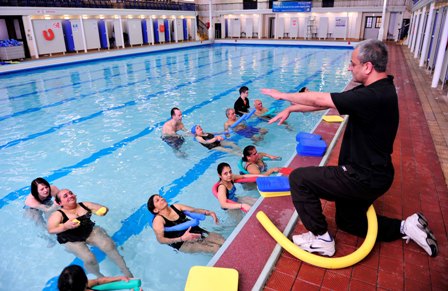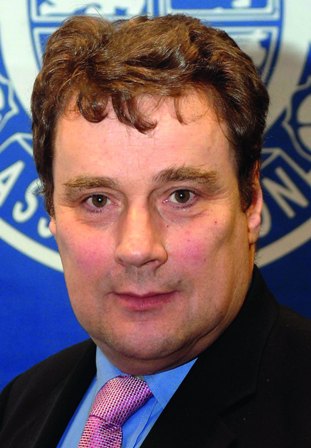
Poolside: home to the real business of the development of swimming
Different strokes: David Sparkes on swimming
The chief executive of British Swimming and the ASA, the national governing body for aquatic sports, talks to The Leisure Review about the past, the future and life in the water.

Poolside: home to the real business of the development of swimming
The Skills Protocol Employer Leadership Group (SPELG) launched their Physical Activity, Sport and Active Leisure report earlier this year. What is the ASA’s view of the SPELG report and what impact do you think it will have on the swimming industry and the ASA?
Of course we welcome the publication of the report as it is essential to know what the future skills requirements of the industry are, if it is to continue to grow and have a direct impact on wider issues including the health and wellbeing of the nation. It highlighted that the industry itself must lead the development of qualifications and I support and welcome this. We have to make sure that we listen and be aware of what the industry needs so that we can speak with one voice. We should all stop and think how we can respond to this now to deliver the single qualification programme but most importantly deliver it with quality. The leadership needs to come from the employers but they can be sure that they have the backing of the ASA to provide the industry with professionally qualified and trained staff.
As a key player in the sport and sports development industry who is known for being forthright in their views, what changes do you think we can expect to the landscape in the next five years?
The industry as a whole needs to improve the level and extent of their skills. Specifically we need to help support them in developing better quality and more highly skilled managers, who have a comprehensive understanding of marketing and how to make sure the customer is at the heart of everything they do, at the very core, alongside the important technical knowledge required. It’s also very important to recognise that training staff to fulfil more than one function can bring benefits on many levels – to the employer and the employee. Apprenticeships will continue to provide many opportunities for young people to have a career in sport and leisure. Another area is blended learning – the industry needs to seize the power of the internet and take positive action to incorporate e-learning into training plans for their staff. With an investment by the industry into staff training and development, they will have better qualified and better skilled managers with an enthusiastic and educated team to back them up, and the industry will prosper.
What impact have the UK Coaching Certificate (UKCC) qualifications had on the aquatics industry?
The UKCC has changed the shape and quality of aquatics education across the whole of the UK. It means that teachers and coaches are trained to a recognised standard of competency and clubs and parents alike can be satisfied that whoever is teaching or coaching will have been through a formal, stringent, quality-assured training and qualification structure, which has been led by the industry to ensure the right content, resources and tutor training has been implemented. There is a much greater emphasis now on the art of teaching and coaching which is so important when you consider the impact on the customer. You can have all the technical content and knowledge in your head in the world but if you can’t communicate it effectively and use it to motivate swimmers then you’re dead in the water essentially. The UKCC reflects both the needs of the industry and the needs of the customer, and as such it offers the best solution for the industry. We get better swimmers, happier swimmers and many more customers.
With councils being forced to make radical savings and the government preaching ‘big society’ messages, do you think we will see swimming clubs running swimming pools any time soon?
We will certainly see many new models of building and operating pools in the future with pools passed across to voluntary clubs, both swimming clubs and community clubs. We will also see education establishments running pools and you can be sure that trusts and entrepreneurs will also see the opportunity. The only thing I am certain of is that less and less pools will be operated by traditional local authorities.
There seems to be a proliferation of institutes, associations and interest groups in the aquatics universe, each with its own agenda. Would the sport, and those who seek to deal with it, be better served by a single body to represent it to politicians, to professional colleagues and to the public in general?
In an ideal world ALL the agencies would join together and build a single, new, focused agency for swimming. Unfortunately this is unlikely, given the home country issues, with sport a devolved responsibility, and the history and tradition that sit behind all the various agencies. However, we must, and will, continue to collaborate with all the relevant agencies to make life as easy as we can for the industry and at the end of the day make our representation to the general public as clear and easily accessible as possible.
The sport, leisure and culture sector seems rudderless and under pressure. Who should we be looking to for leadership?
Firstly, we need leadership from government to make sport a statutory provision in England. This will give us more political power. Then we need to build around the existing agencies a strong leadership team to drive change, with support from health, local government, central government and the voluntary sector.
What will you consider a good Olympics and Paralympics in the pool?
For the nation to be proud and inspired by the performance of all the British athletes in all the sports. To follow that with a strong legacy for our sport.
What impact do you envisage Hadid's Olympic pool having on your sport?
It is an iconic building and in legacy mode it will be even more stunning. It will house and see many great performances from British Athletes for the next 50 years.
What can aquatics learn from other sports?
Much. We can all learn from each other, from how cycling has built such a powerful team to how some of our smaller sports have built up the numbers doing their sport. When we stop learning it is time to stop.
The Leisure Review, October 2011
© Copyright of all material on this site is retained by The Leisure Review or the individual contributors where stated. Contact The Leisure Review for details.
Download a pdf version of this article for printing
